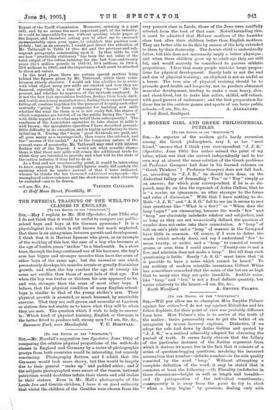THE PHYSICAL TRAINING OF THE WELL-TO-DO CLASSES IN ENGLAND.
[To TUE EDITOTt OF TUE "SpEcTrroc.-) SIR,—May I explain to Mr. Hill (Spectator, June 17th) why "I do not think that it would be useful to compare our public- school boys and boys at the German gymnasia ? It is a physiological law, which is well known but much neglected, that there is an antagonism between growth and development. I think that it is Herbert Spencer who gives, as an example of the working of this law, the case of a boy who becomes at the age of twelve years "striker" to a blacksmith. In a short time, through the long-continued use of his hammer, the boy's arm has bigger and stronger muscles than have the arms of other boys of the same age ; but the excessive use which prematurely develops his muscles arrests or greatly diminishes growth, and when the boy reaches the age of twenty his arms are smaller than those of most lads of that age. Yet when the boy was twelve or thirteen his arm appeared to be, and was, stronger than the arms of most other boys. I
• believe that the physical condition of many English school- boys is similar to that of the young striker's arm. Their physical growth is arrested, or much lessened, by unsuitable exercise. That they are well grown'and muscular at fourteen or 'sixteen does not enable us to knOw what they will be when they are men.' The question which I wish to help to answer is : Which kind of physical training, English or German, is the better fitted to produce tall, strong men ?—I am, Sir, &c.,
Swanscoe Park, near Macclesfield. T. C. HOESPALL.


















































 Previous page
Previous page